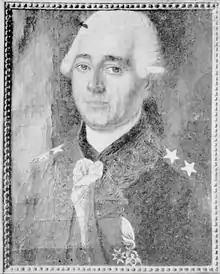Louis de Raimondis | |
|---|---|
 | |
| Born | Draguignan |
| Died | 1 February 1801 Lorgues |
| Occupation | Officer of the French Navy |
Louis de Raimondis[Note 1] (Draguignan, 1723 — Lorgues, 1 February 1788)[1] was a French Navy officer. He served in the War of American Independence, and became a member of the Society of the Cincinnati.[3]
Biography
Raimondis was born to a family from Provence with a strong naval tradition,[3] and a long involvement in the administrative affairs of the Kingdom. Members of the family had held positions of Seneschal[4] or of Lieutenant principal and Lieutenant général in the administration,[5] and had been supporters of the Crown during the Fronde.[6] One of his ancestors had served as major general of the Navy and had been killed at the Battle of La Hougue. [3]
Raimondis joined the Navy as a Garde-Marine in 1745.[3] He was promoted to Lieutenant in 1757.[3] He served on Modeste in the squadron under La Clue, under Dulac de Montvert.[3][2]
In 1769, he captained the xebec Singe off Porto-Vecchio.[3] In 1770, he took part in the French conquest of Corsica[1] as an officer on the 64-gun Provence.[7]
Raimondis was promoted to Captain in 1772.[3] From 1773 to 1776, he served on Zélé,[8] and in 1775 he was captain of the 24-gun frigate Gracieuse.[9][10][11] From 1778, he commanded the 74-gun César as flag captain to Chef d'escadre Broves in the fleet under Vice admiral d'Estaing.[3]

On 16 August 1778, César captured HMS Iris near Rhodes Island. During the battle, a cannonball ripped off Raimondis' right arm. First officer Moriès de Castellet took over command of César. Raimondis was disembarked at Boston on 27 October due to his wounds.[3] In recognition of his service, he was awarded two pensions[3] and the Order of Saint Louis.[1] He also received a sword of honour from the Americans.
In 1782, Raimondis was promoted to Brigadier. He rose to Chef d'escadre in 1784.[3]
Sources and references
Notes
References
- 1 2 3 4 Bourrilly (1937), p. 433.
- 1 2 Archives nationales (2011), p. 148.
- 1 2 3 4 5 6 7 8 9 10 11 12 Contenson (1934), p. 249.
- ↑ Piétri (2005), p. 167.
- ↑ Piétri (2005), p. 169.
- ↑ Piétri (2005), p. 180.
- ↑ Archives nationales (2011), p. 185.
- ↑ Archives nationales (2011), p. 193.
- ↑ Archives nationales (2011), p. 199.
- ↑ Archives nationales (2011), p. 200.
- ↑ Archives nationales (2011), p. 202.
Bibliography
- Bourrilly, Victor-Louis (1937). "Périodiques français méridionaux". Annales du Midi. 49 (196): 432-436.
- Contenson, Ludovic (1934). La Société des Cincinnati de France et la guerre d'Amérique (1778-1783). Paris: éditions Auguste Picard. OCLC 7842336.
- Lacour-Gayet, Georges (1905). La marine militaire de la France sous le règne de Louis XVI. Paris: Honoré Champion. OCLC 763372623.
- Piétri, Valérie (2005). "« Une charge très honorable » : service du roi et reconnaissance sociale en Provence orientale aux XVIIe et XVIIIe siècles". Annales du Midi (in French). 117 (250): 163–185. doi:10.3406/anami.2005.7088. ISSN 0003-4398. OCLC 99466097. 5787390995. Retrieved 30 May 2020.
- Troude, Onésime-Joachim (1867). Batailles navales de la France (in French). Vol. 2. Challamel ainé. OCLC 836362484.
External links
- Archives nationales (2011). "Fonds Marine, sous-série B/4: Campagnes, 1571-1785" (PDF). Retrieved 29 April 2020.